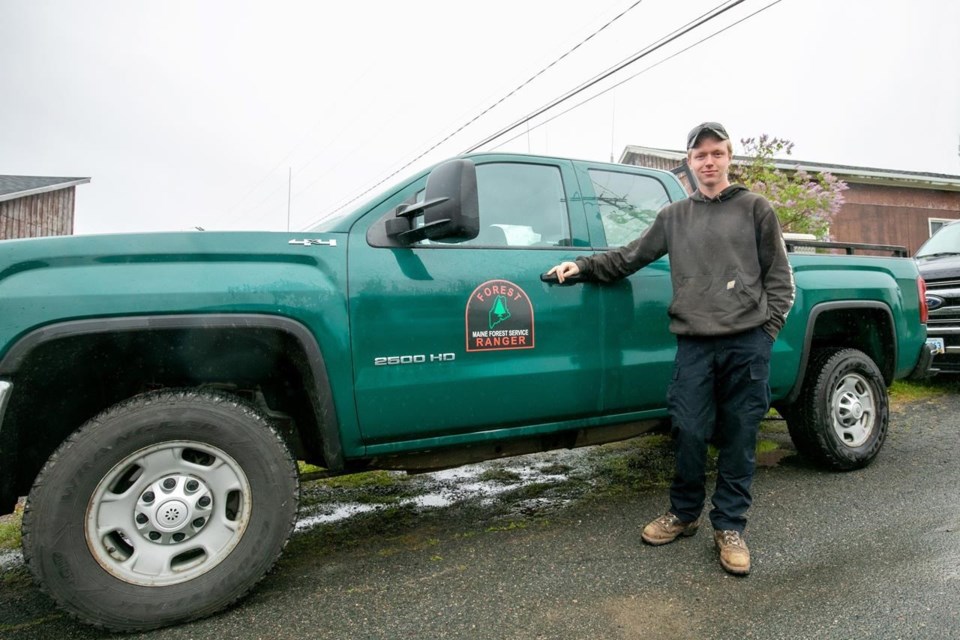MONTREAL — Eighteen-year-old Hunter Sousa from Maine celebrated his high school graduation by hopping in a truck and heading to Nova Scotia to fight the biggest forest fire in the province's history.
Sousa works for the Maine forest service as an on-call firefighter, but had never before fought a fire. The call from his superior came on a Thursday.
"They said they'd be meeting in Bangor Friday night and I had my graduation Friday night, so I graduated and got my diploma, and headed to Bangor and met with the rest of the crew, and then we headed to Nova Scotia," he said in a recent interview.
Sousa is one of the many foreign firefighters who were pressed into service as Canada battles its worst wildfire season in recent memory. Hailing from 10 different countries on five continents, they've been battling flames, fatigue and mosquitoes during stints of 14 consecutive days or more in unfamiliar conditions.
In Sousa's case, his main duty at the Barrington Lake fire, in Nova Scotia's southwest, consisted of mapping the extent of the fire by walking around the edge of the burned sector — called the “black” — and marking the perimeter in an app on his phone, as well as putting out the occasional hot spot.
For some other firefighters, their trip to Canada has yielded a front-row view to infernos of a magnitude few of them had ever seen.
Eric Flores, the head of a team of more than 100 French firefighters dispatched to Quebec, says the fires are far larger — and more challenging — than what he usually sees at home.
Flores was dispatched to Quebec's Mauricie region, in an area near a First Nations village that can only be accessed by helicopter. During a recent phone interview, Flores said that while the area is wet and swampy, the fire travels through root systems underground, and even under water.
"Despite the fact that we have our feet in the water, it's burning," he said.
Flores and his team have been tasked with saving the northern Atikamekw village of Obedjiwan from a 150-square-kilometer fire burning out of control. He said the firefighters are focusing on holding the southern line close to the village with fire breaks, hoses and by digging out smouldering embers before they reach surface vegetation.
"Since there are immense trees, the fire takes on inconceivable views very quickly because once the fire starts to come out of the soil, it attacks the trees, it rises to the top and you have trees of 30, 40 metres and that's how you have big fires that start very, very quickly," he said.
As of Wednesday evening, he said the firefighters had been successful at holding back the flames from the community. They've been less successful, however, at holding back the "incredible number" of flies and mosquitoes that he describes as their biggest challenge.
"Sometimes they're getting eaten alive."
As of Thursday, there were 1,477 foreign firefighters in Ontario, Quebec, British Columbia and Alberta deployed through the Canadian Interagency Forest Fire Centre, the group said in an email. That number includes firefighters from Mexico, Portugal, Australia, New Zealand, Chile, Costa Rica, Spain and the United States.
One of the largest contingents is made up of 400 people from South Africa, who are deployed to Alberta and working shifts of 14 days straight, followed by four days off.
Vincent Lubisi, a strike team leader, has said the South Africans have had to learn how to fight fires in a country with different vegetation and climates.
In Edson, Alta., where he's been working, he said the focus is on securing the perimeters of the fire and slowly working inward.
"In South Africa, they fight the fire more directly," he said.
The contingent includes coordinators such as Antoinette Jini, who helps organize teams on the ground, making sure the assignments are understood and the proper information gets conveyed.
While South Africans are here to help, she says their experience in Canadais mutually beneficial because it has allowed them to learn about North American resources and techniques, such as those used to map fires.
"We have built the relationship and we've learned many things while we're engaging and collaborating," she said in a recent interview.
While the firefighters are working hard, all of them say they've also enjoyed the experience. Sousa has appreciated the beauty of Nova Scotia and the support from residents, while Lubisi says he has had fun collaborating with his foreign colleagues.
Flores said the French crews were planning Wednesday evening to find time to celebrate the French Fête de la Musique holiday with a little celebration and a few beers. The party would end early, he said, noting the firefighters needed to get up at 5 a.m. the next day for another long day in Quebec's woods.
This report by The Canadian Press was first published June 23, 2023.
Morgan Lowrie, The Canadian Press




